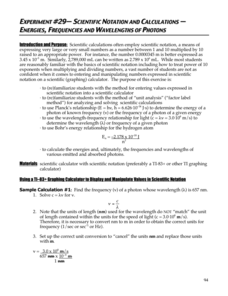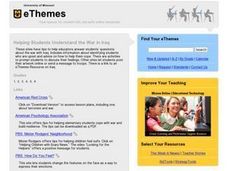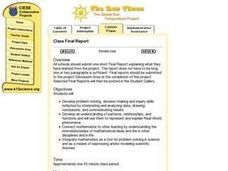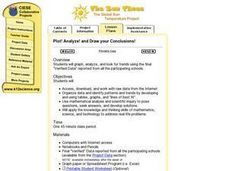Nemours KidsHealth
Food Labels: Grades 3-5
Bring awareness to the ingredients scholars ingest daily with two lessons that look deeply into food labels. The first lesson explores the difference between processed and fresh foods while the second lesson focuses on sugar content.
Nemours KidsHealth
Healthy Relationships: Grades 9-12
After reading a series of informative articles about healthy and abusive relationships, class members demonstrate what they have learned as they take on the role of RESPECT hotline counselors and offer advice to fictional victims of...
Houghton Mifflin Harcourt
Special Friends: English Language Development Lessons (Theme 9)
Enhance language proficiency with a Special Friends themed English language development unit. Each lesson follows a listen, speak, move, and/or look routine that is guaranteed to get your scholars discussing topics such as animal...
Teach Engineering
Exploring Energy: Energy Conversion
The energy is not really lost, it is just converted to a different form. Pupils learn about the conversion of energy in the fifth segment of an energy unit with six parts. Learners develop an understanding of the conservation of energy...
Pingry School
Scientific Notation and Calculations – Energies, Frequencies, and Wavelengths of Photons
The calculator has an interesting way of displaying numbers in scientific notation, but don't let that confuse your pupils! A lesson designed to give learners practice with scientific notation and calculators provides several practice...
Society for Science & the Public
Easter Islanders Made Tools, Not War
When studying artifacts, especially tools, how do archaeologists determine what the devices were used for? In what ways might researchers' previous experiences influence their perception of an artifact? An article about researchers'...
Curated OER
Mira: Activity 10
Students read the story, Mira and then draw a picture of their favorite weather using the story as a background. They post their pictures around the room and make a tally chart of the number of pictures that were drawn with various...
Leadership Challenge
Know/Want To Know
What I know. What I want to know. What you need to know. These are the questions that form the basis for a displayed thinking activity that encourages future leaders to "set out with intention and purpose."
Curated OER
Draw your Conclusions
Students analyze data from a student discussion website and write a report on the outcome of an investigation regarding their local water quality. As part of a larger unit students then post the summary of their investigation on the...
Curated OER
Helping Students Understand the War in Iraq
Students ask and answer questions about the war with Iraq. Advice is provided on how to help them cope. There are activities to prompt students to discuss their feelings. Other sites let students post their artwork online or send a...
Curated OER
Class Final Report - Global Sun Temperature Project
Students reflect on the data they have analyzed during the Global Sun Temperature Project. They use the project website as a resource for their observations, draft a class report and post it on the Internet.
Curated OER
Record the Data and Find the Averages
Learners record the daily outdoor temperature as well as the number of minutes of sunlight per day over a determined period. They calculate the average temperature and minutes of sunlight per day and post their data on the project website.
Curated OER
Plot! Analyze! Draw your Conclusions!
Students download data reported from the Global Sun Temperature Project website. They graph and analyze the data looking for trends and patterns. They prepare a class report with their observations and post it to the website.
Curated OER
Class Letter of Introduction
Students follow guidelines to collectively draft a class letter that introduces their school to the rest of the participants in an online science experiment about water quality. They post the letter online as part of the larger unit.
Curated OER
The Impact of Fishing
Students explore the concept of fishing as it relates to oceans and how some fishing practices can damage the health of the marine ecosystems. In this activity on the impact of fishing, students research the many places in the world...
Curated OER
Anti-Semitism Workshop
Originating from the Yad Vashem Holocaust Memorial Museum in Jerusalem, here is a resource to support your world historians in their study of World War II, the Holocaust, your cultural scholars learning about anti-semitism, or your...
Equality and Human Rights Commission
Taking Action
The Universal Declaration of Human Rights passed in 1948 when the majority of members of the United Nations voted in favor of the resolution. Scholars use their knowledge of human rights to determine ways they personally can help promote...
Curated OER
Building Vocabulary with Model Airplanes
Your class can build new vocabulary while they study aircraft terminology. In order to work around pilot when they are on the flight line, learners build a model airplane applying the new vocabulary as they go. This hands-on real life...
Curated OER
DONDE VIVES?
Learners discuss the rooms of a house, using location expression. They work in groups as "extended families" and use magazine pictures to describe their relatives.
Curated OER
"You Can't Catch Me!"-Introducing Young Children to the School Setting
Students use photography to create art projects.
Curated OER
Grammarcise
Students conceptualized, planned story sequences, shot slides, and recorded narration for a slide/tape presentation on the eight parts of speech. They demonstrate the grammatical element and then include it in a sentence in each slide...
Curated OER
Fractions Made Visible
Students practice using fractions "on the job." They explain the importance of fractions.
Curated OER
Earth's Biomes
Tenth graders examine characteristics and animals of terrestrial biomes. In this Earth's biomes lesson, 10th graders view a PowerPoint, take noes, sort pictures, research biomes, and create a diorama of a biome for presentation.
Curated OER
Creating Characters
Learners examine the methods of effective characterization. In this writing skills lesson, students discuss how emotions, dialogue, actions, and physical descriptions build believable characters. Learners then use the methods of...























